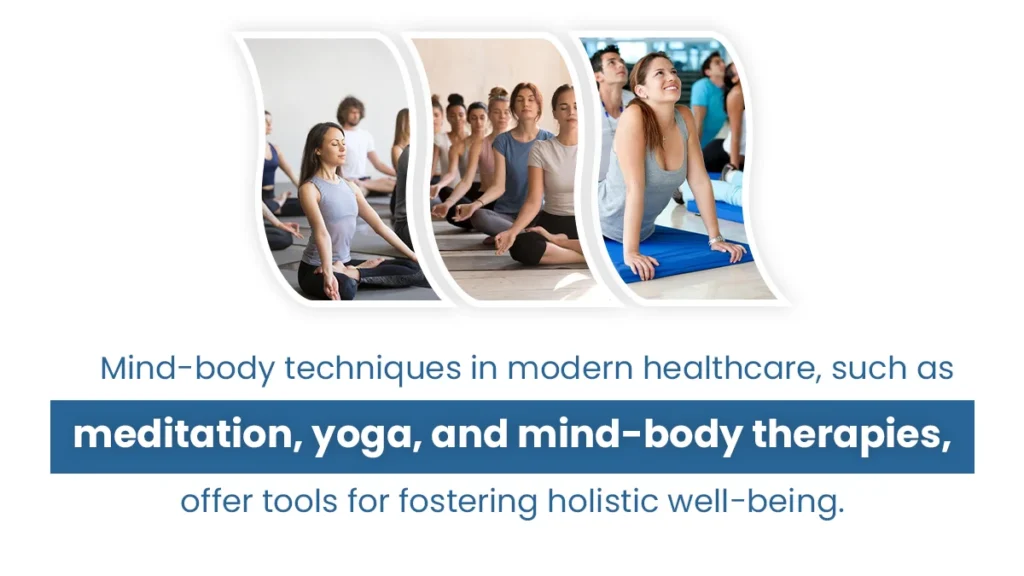The mind-body connection is the strong relationship between our thoughts, emotions, and physical well-being. Our mental health significantly impacts our physical health.
When we experience stress, anxiety, or sadness, our bodies can react with symptoms like headaches, tense muscles, or fatigue. On the other hand, a positive mindset can strengthen our immune system, boost energy levels, and expedite healing.

This article explores the scientific view of the mind-body connection, showing how our thoughts impact our physical state. We’ll discover key aspects of this connection and learn how to weave mind-body principles into our daily lives.
Key Takeaways
The connection between our thoughts, emotions, and physical well-being is the mind-body connection. Here’s what this article delves into:
- Scientific research highlights the essential mental and physical health bond within the mind-body connection.
- Mind-body techniques in modern healthcare, such as meditation, yoga, and mind-body therapies, offer tools for fostering holistic well-being.
- Nurturing emotional, physical, and spiritual health collectively leads to a more balanced and fulfilling life.
- Incorporating mind-body principles, such as exercise and a balanced diet, can profoundly impact daily routines.
Seeking professional help from The Haven Detox-Little Rock can help overcome challenges arising from mind-body connection disruptions. Contact us at (501) 271-3342 today.
Mapping the Mind-Body Link: Scientific Perspectives
The mind-body connection, a captivating field of study, explores how our thoughts and emotions can profoundly influence physical well-being. Let’s explore some key scientific perspectives that shed light on this connection.
Role of Neurotransmitters
Neurotransmitters, tiny chemicals in our brains, play an important role in the mind-body connection. They act as messengers, transmitting signals between nerve cells. These neurotransmitters come into play when we experience emotions like happiness or stress. For instance, serotonin contributes to feelings of well-being, while cortisol, the stress hormone, can affect our body’s response to stressors.
Psychoneuroimmunology Paradigm
Another fascinating viewpoint is the psychoneuroimmunology paradigm. This term describes how our thoughts and emotions can influence our immune system. Studies have shown that stressful and negative emotions can weaken our immune system, making us more vulnerable to illnesses. Conversely, maintaining a positive outlook can have a protective effect on our immune response.
Placebo Effect
The placebo effect reveals the power of our mind in influencing our body’s responses. When people believe treatment is beneficial, their bodies often respond positively, even if it is a sugar pill with no medical value. This shows how our thoughts can impact our physical sensations, emphasizing the connection between the two.
Mind-Body Techniques: Redefining Healthcare Practices
In today’s healthcare landscape, mind-body techniques are gaining recognition for their positive impact on overall health. These approaches acknowledge the interconnection of our mental and physical states, offering holistic solutions for a healthier life.
Mindfulness Meditation: Practicing mindfulness involves being present at the moment, which can reduce stress, anxiety, and depression. Regular meditation cultivates awareness of thoughts and emotions, promoting emotional balance.
Yoga and Tai Chi: These ancient practices combine gentle movements, breath control, and meditation. They improve flexibility, balance, and mental focus, contributing to physical and mental wellness.
Biofeedback: This technique helps individuals gain control over physiological functions like heart rate and muscle tension. People learn to manage stress and anxiety effectively by visualizing and adjusting these responses.
Relaxation Techniques: Deep breathing exercises, progressive muscle relaxation, and guided imagery promote relaxation and alleviate physical tension, fostering a healthy mind-body connection.
Cognitive Behavioral Therapy (CBT): Cognitive behavioral therapy (CBT) addresses negative thought patterns and behaviors. It equips individuals with tools to manage stress, improve mood, and enhance overall mental health.
Music and Art Therapy: Engaging with music and art can promote emotional expression and stress relief. These creative outlets can enhance mood, reduce anxiety, and improve mental clarity.
These mind-body techniques empower individuals to participate in their well-being, contributing to healthy living actively. As modern healthcare continues to embrace these holistic approaches, more people are discovering the profound benefits of nurturing their mind-body connection.
A Holistic View: Different Aspects of Mind-Body Link
The mind-body connection encompasses a trio of vital aspects. Emotional, physical, and spiritual health. Let’s delve into these dimensions and see how they intertwine to shape our well-being.
Emotional Health
Emotional health stands at the core of the mind-body connection. Our thoughts and feelings have a profound impact on our bodies. When we experience stress or anxiety, our bodies might respond with tense muscles or a racing heart. Conversely, positive feelings like happiness can bring a sense of ease to our physical state. Cultivating emotional well-being through mindfulness and self-care can directly influence bodily health.
Physical Health
Physical health, the most apparent aspect, is closely linked with our mental state. Chronic stress or anxiety can manifest physically as headaches, digestive issues, high blood pressure, or even weakened immunity. Conversely, regular exercise and a balanced diet can uplift mood and boost mental resilience. Taking care of our physical health directly supports our mental well-being.
Spiritual Health
Spiritual health, often overlooked, plays a significant role in this complex interplay. It’s about finding purpose, connecting with inner values, and seeking a deeper meaning in life. Nurturing our spiritual well-being through meditation or time in nature can positively affect our mental and physical health.
Mindful Living: Integrate Mind-Body Principles Daily
Incorporating mind-body principles into our daily routines can lead to a balanced and meaningful life. You can unlock a harmonious and balanced existence by focusing on aspects like exercise, nutrition, sleep, meditation, and other key principles.
Regular Exercise
Physical activity is not just about staying fit; it’s also a powerful tool for boosting mental health. Engaging in regular workout sessions triggers the release of endorphins, which serve as natural mood boosters. A brisk walk, a dance session, or a yoga class can help alleviate stress and anxiety. By setting aside time for physical activity each day, we can promote mental clarity and physical vitality.
Good Nutrition
What we eat affects our mental and physical health. Incorporating a balanced diet rich in veggies, fruits, lean proteins, healthy fats, and whole grains provides the nutrients our brain and body need to function optimally. Avoiding excessive sugar and processed foods can help maintain stable energy levels and support mental focus.
Adequate Sleep
Getting enough quality sleep is crucial for restoring both your body and mind. A consistent sleep timetable and a relaxing bedtime routine can greatly enhance sleep quality. With a well-rested mind, you’ll be better equipped to handle stress, regulate emotions, and make sound decisions.
Engage in Mindful Activities
Practicing mindfulness through meditation can foster a deeper connection between the mind and body. Spending a few minutes daily to sit quietly, concentrate on your breath, and observe your thoughts without judgment can reduce stress, increase self-awareness, and enhance overall emotional well-being.
Practice Mindful Breathing
Conscious breathing exercises, like deep breathing or diaphragmatic breathing, can quickly calm the nervous system and reduce stress. By taking slow, deep breaths, you can signal to your body that it’s safe, which can help alleviate tension and anxiety.
Create Meaningful Ties
Humans need to maintain meaningful connections to improve their mental and emotional well-being as social beings. You can spend time with family and friends, engage in hobbies, and foster a sense of community. Sharing your feelings and thoughts with others can offer support and provide a fresh perspective during difficult times.
Embrace Gratitude
Cultivating a sense of gratefulness can greatly influence your perspective on everyday life. Regularly take a moment to reflect on the positive aspects of your day, no matter how small. This practice can shift your focus from negativity and enhance your overall contentment.
Frequently Asked Questions (FAQ)
What is the mind-body connection in psychology?
The mind-body connection in psychology refers to how our thoughts and emotions affect physical health. It links our thoughts and feelings and how our bodies respond. For instance, stress can lead to headaches or tense muscles. This connection shows that our minds and bodies are closely intertwined, influencing each other in important ways.
How do you build a mind-body connection?
Practice activities that link your thoughts and physical sensations to build a strong mind-body connection. Try mindfulness exercises, where you focus on the present moment. Engage in regular workout sessions and eat nutritious foods to support your mind and body. Techniques like meditation and deep breathing can also help you become more aware of this connection.
What is the relationship between the mind and the body?
The mind and body are closely connected. Our thoughts, feelings, and emotions (mind) can impact our physical health (body). Stress, for example, can lead to physical tension and chronic pain. Happiness can make us feel more relaxed. Taking care of both aspects through exercise and relaxation can help maintain a healthy balance between the mind and body.
The Haven Detox-Little Rock: Transforming Lives
Discover the key to lasting well-being. A strong mind-body connection. An imbalance in this vital link can pave the way for struggles with drug addiction and mental health challenges. But worry not, for change is within your reach.
Don’t wait another moment if you’re grappling with addiction or mental health issues due to this disruption. Seek expert aid at The Haven Detox-Little Rock, your beacon of hope. Our professional treatment can be your turning point, guiding you toward a brighter future.
Our services are tailored just for you. With medical detox and residential treatment, our dedicated team will guide you every step of the way. Our IV therapy will help restore the vital nutrients that substance abuse has depleted, promoting holistic healing.
Don’t let time slip away. Contact us at (501) 271-3342 today. Choose The Haven Detox-Little Rock as your partner in reclaiming a life full of vitality, joy, and resilience.



